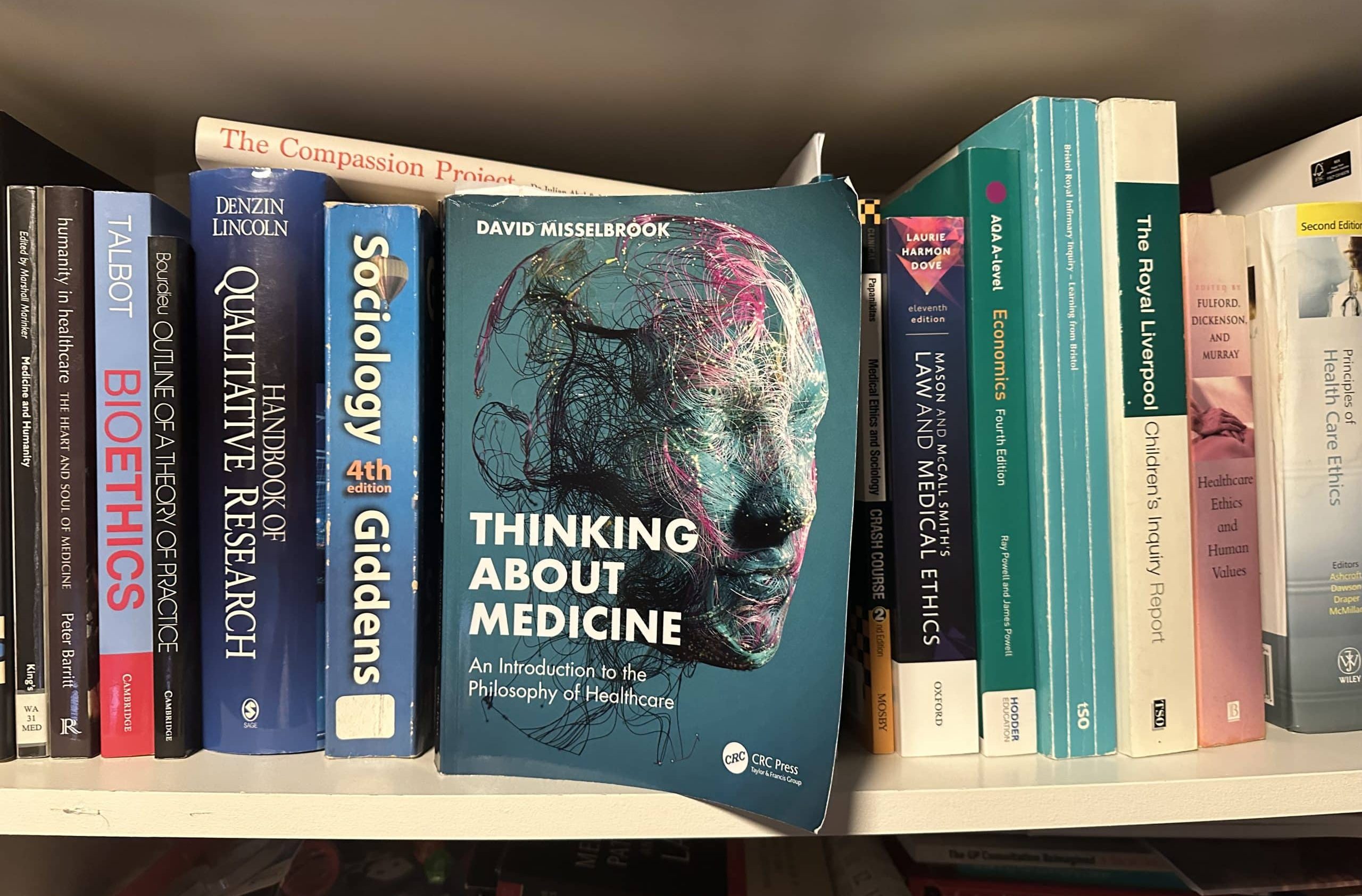 Andrew Papanikitas is Deputy Editor of the BJGP. He is on X: @gentlemedic
Andrew Papanikitas is Deputy Editor of the BJGP. He is on X: @gentlemedic
This is a morally tricky book review and I hope readers will bear with me. The spoiler is that despite my own conflicts of interest I have no qualms in recommending ‘Thinking about Medicine’, whether as a recommended introductory text in medical philosophy or a survival tool for thoughtful clinicians.
David Misselbrook is senior ethics advisor for BJGP and has a distinguished career in medical education. This includes teaching critical thinking and ethics to medical students, supervising postgraduate education for GPs in south London and for doctors in general at the Royal Society of Medicine and a professor at an international Medical School, as well as a lifelong GP (now retired). He is the author of a medical philosophy series aimed at doctors in BJGP1 and my predecessor as course director for the UK’s oldest medical philosophy course. I read my copy with trepidation, knowing that I had encouraged him to write it (It’s in the acknowledgements – thanks David!). Thankfully the blending of experience, theory and relevance works extremely well – The book is an engaging text that speaks to -and speaks for- clinicians, and it is far from dry. The text also serves as follow on companion to ‘Thinking about patients,’ a similarly engaging companion to sociology and psychology in medicine.2
The book is an engaging text that speaks to -and speaks for- clinicians, and it is far from dry.
Misselbrook illustrates concepts with case reports, mini-reviews of key texts which we may well have heard of but never had explained to us (such as The Structure of Scientific Revolutions), observations from his personal life and the occasional gratuitous factoid. Deductive reasoning (If A then B. We have B, therefore B) is illustrated with one of the author’s worst missed diagnoses, which made perfect sense until the patient died suddenly of something else. He goes on to demonstrate a list of clinically dangerous deductions. For example, B-blockers are negatively inotropic; therefore they should not be used in heart failure… Except we know that they are useful in this very instance. The author also appeals to our ability to make decisions about what is good and bad, right and wrong. We do this when we aim at being virtuous practitioners, we weigh the benefits and harm in what we do, we evaluate our act in relation to their nature (do they respect people fully as ‘persons’?), and we work within a network of social relations. I should add that cases are very carefully anonymised with explicit reference to UK General Medical Council guidance on the use of patient cases for educational purposes. The book ostensibly focusses on western philosophy, which, after represents much of the bedrock of western medicine. However, there is a tantalising section on intercultural ethics, informed by the author’s time spent in a middle-eastern Arabic culture.
…a better understanding of philosophy applied to medicine might not endear you to your manager, presumably as you challenge directives that you come to believe are erroneous or misguided.
I have lost track of the times I’ve been told that we don’t have time to think more deeply about what we do in medicine and why we do it. We could make time to do so, and it might pay off. Which bring us to the other, more ideological declaration of interest. A number of doctors, perhaps overrepresented by GPs such as the author of this book, have long argued that medicine needs philosophy (including ethics) as a way of keeping clinicians intellectually and morally articulate.3,4 For example, a qualitative study of commissioners’ educational needs vis a vis ethics (DOI – I co-authored) found exactly this, a lack of formal (shared) language and explicit reasoning to appraise and critique what healthcare should be provided, despite a ‘gut’ sense of right and wrong.5
“We can be quite good at talking past each other without understanding why,” muses David Misselbrook. He suggests that a better understanding of philosophy applied to medicine might not endear you to your manager, presumably as you challenge directives that you come to believe are erroneous or misguided. I suspect that this is tongue in cheek, as better and more coherent decision-making arguably protects employers and institutions, and better serves the goals of medicine. Oh… and what are the proper goals of medicine you ask? It depends on what we mean by health and what we classify as healthcare. There is a chapter decrypting these very questions. Misselbrook masterfully uses the tools of philosophy to explain to us how we think the way we do, how we can think more clearly. In a political climate dominated by polarising and often poisonous rhetoric, bullshit-detection skills are the least of what this book has to offer.
Featured text: David Misselbrook, Thinking about medicine: An introduction to the philosophy of healthcare, CRC Press, ISBN 9781032416731, paperback, 336 pages, RRP £34.99, https://www.routledge.com/Thinking-About-Medicine-An-Introduction-to-the-Philosophy-of-Healthcare/Misselbrook/p/book/9781032416731
References
- Misselbrook D. An A-Z of medical philosophy. Br J Gen Pract. 2013 Jan;63(606):36. doi: 10.3399/bjgp13X660841. PMID: 23336458; PMCID: PMC3529269.
- Papanikitas A. Books:Thinking About Patients: The psychology and sociology of medicine. Br J Gen Pract. 2024 Apr 25;74(742):225. doi: 10.3399/bjgp24X737301. PMID: 38664040; PMCID: PMC11060804.
- Papanikitas A, De Zulueta P, Spicer J, Knight R, Toon P, Misselbrook D. Ethics of the ordinary: a meeting run by the Royal Society of Medicine with the Royal College of General Practitioners. London J Prim Care (Abingdon). 2011 Jul;4(1):69-71. PMID: 25949651; PMCID: PMC3960673.
- Toon P, Healthcare is both a science and an art, British Journal of General Practice2012; 62 (601): DOI: https://doi.org/10.3399/bjgp12X653705
- Knight S, Hayhoe BW, Frith L, Ashworth M, Sajid I, Papanikitas A. Ethics education and moral decision-making in clinical commissioning: an interview study. Br J Gen Pract. 2019 Dec 26;70(690):e45-e54. doi: 10.3399/bjgp19X707129. PMID: 31848203; PMCID: PMC6917357.
Featured image taken by Andrew Papanikitas, June 2024







[…] is from Thinking About Medicine – An Introduction to the Philosophy of Healthcare, by David […]
[…] is from Thinking About Medicine – An Introduction to the Philosophy of Healthcare, by David […]
[…] is from Chapter 5 of Thinking About Medicine – An Introduction to the Philosophy of Healthcare, by David […]